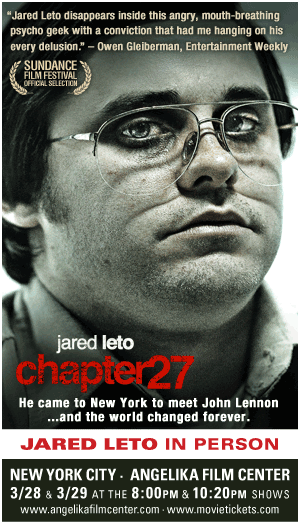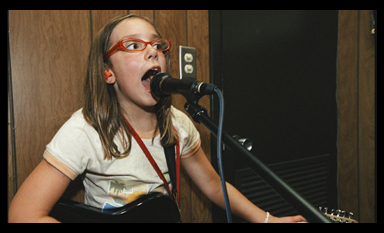March 3, 2008
X-MEN writer Zak Penn does a 180 in directing his new movie, THE GRAND, a hilarious, low-budget poker-themed mockumentary that features an unbeatably witty cast that includes Woody Harrelson, Cheryl Hines, Ray Romano, Chris Parnell, David Cross, Werner Herzog and Richard Kind.
The always articulate director chatted with us last weekend about the making of THE GRAND….check out what he had to say below.
Q: How did you come up with the idea for THE GRAND?
A: The idea actually was pitched to me by my friend Matt Bierman, the other credited writer. He knew that I had done INCIDENT AT LOCH NESS, which was also improvised, and that I was looking to do another improvisational film that was kind of in the Christopher Guest vain. He pitched me the idea and I said letâ??s go do it.
Q: I wanted to ask you too â?? are you sick of the Christopher Guest referencesâ?¦.or how to you feel about them?
A: Iâ??m not sick of them! First of all, I love Christopher Guest. I think when people compare the movie to his work, Iâ??m flattered because you couldnâ??t pick a better person to be compared to. Iâ??m not sick of it. I think Iâ??m lucky if people are comparing this film to one of his because his films are really excellent.
Q: So what do you think is so consistently appealing about the mockumentary?
A: First of all the mockumentary styleâ?¦thereâ??s a certain type of joke that works really well in the mockumentary â?¦.even if you look at shows like THE OFFICE or EXTRASâ?¦.itâ??s really taking a documentary style and turning it into comedy. Itâ??s less about mocking a documentary, and the particulars of shooting in a mockumentary style lend themselves to a very dry sense of humor.
The other thing is itâ??s a really efficient way to shoot when you can cut to a character talking directly to camera or when you can cut to an interview. It allows you to shoot a lot more stuff and cut it together without having an enormous budget, so thereâ??s actually a very practical reason to shoot that way. And for me, itâ??s just that a lot of the jokes that I come up with seem to work well in that format and so I use it where I think it helpsâ?¦.the movie pretty seamlessly transitions between moments that seem like a documentary, and then suddenly youâ??re in a scene thatâ??s shot like a normal film.
Q: Is the whole thing improvised?
A: Itâ??s all improvisedâ?¦itâ??s an outline so I know whatâ??s going to happen and whoâ??s in each scene, but every bit of the dialogue is improvised.
Q: You got a lot of the actors who have been on various poker shows, like that one on BravoTVâ?¦did you have them in mind when you were developing the outline?
A: Once the idea was pitched to me I spent quite a bit of time developing it and turning it into an outlineâ?¦ itâ??s not like you donâ??t work from anythingâ?¦you basically end up having what I call a â??scripmentâ? â?? part script and part treatment. Itâ??s basically a 35 page document that describes the story, but it just doesnâ??t have a lot of dialogue. So thatâ??s the first step. While we were doing that, we were developing it for actors that I knew and I that I wanted to work with. Because of the vague schedule of production, it ended up that half the people that I wrote parts for were not available when I was ready to shoot the movie. Someone like David Schwimmer, who was originally going to be in the cast, ended up directing a movie at the same time, so I had to cast somebody else. But really what you more often do is you tailor the part to the actor. Like, I wrote a part for Werner Herzog, and it always stayed the same and he came and did it. For other people, like Chris Parnell, we had a character defined but he turned it into his own thing. The same thing happened with Ray Romano. He just came up with all these details for his character that turned into a much bigger part of the movie.
Ben Affleck was the first actor who was going to be in it, because he was someone I knew and he was really into poker. We had wanted to work together for a while, but he had never been available. So he actually came up with some of the characters- some of the ideas were Benâ??s ideas from the first couple of meetings we had with him.
Q: Did you credit him on the film?
A: No way! Noâ?¦no credit for him!
Q: Did the whole cast know how to play poker? Because the big tournament at the end is a real poker game right?
A: It isâ?¦and no they didnâ??t. You know, Chris Parnell really didnâ??t know how to play at all, and ironically is playing the guy whoâ??s the most skilled. He studied pretty intensely to figure out what he was doing, and we had a poker expert for him to help him with the math and stuff. But I think when you make an improv movie, a lot of actors are suddenly interested because itâ??s rare to get that opportunity to really improvise- itâ??s real actorsâ?? form.
Q: They get to be so creativeâ?¦
A: Exactly. Coming from working on an X-MEN film, where you might spend all day trying to get one shot, to then go to something where youâ??re really in the moment and performing â?? the final table and the way it was filmed was closer to a theatrical performance than a filmed scene.
I mean some of the people did not know anything about poker and we really had to help them. But some of them really did- like Cheryl Hines had just won a tournament, and she and David Cross and Richard [Kind] all play a lot of poker, and Woody [Harrelson] does too, so it was a pretty good mix. Werner knew nothing about poker so we had to teach him
Q: Did you guys make bets on like who you thought was going to win the big tournament?
A: Other people in the crew did, and I heard that all the actors actually bet each other about who was going to winâ?¦I didnâ??t really have time because I was just more worried about actually pulling it off! But I think there was a lot of betting going on everyday on set about everything.
Q: Why is poker so interesting to watch on television, because it doesnâ??t seem like it would inherently be that way, but it kind of isâ?¦.
A: Well first of all I think anything that has got an air of drama and stakes is interesting to watch. Iâ??m not actually that huge a fan of watching poker on TV, which is sort of ironic. I like playing poker a lot but I do think that there are specific aspects that clearly work well as filmed entertainment â?¦.the key to it is that thereâ??s a lot of psychology and personality involved in bluffing, and in the way Texas Holdem is played, itâ??s less about luck and itâ??s more about the character and personality. I think thatâ??s whatâ??s appealing about it when you watch itâ?¦to watch someone walk into a trap or lay a trap, and all of those things that poker brings out at the table.
I was very concerned going into it. I really thought â??I wonder if people are gonna watch even 2 minutes of pokerâ?, but the first couple people we showed it to asked us to put more [footage] in at the final table because they were really into the game.
Q: Is it weird for you to go from working on X-MEN which you know people are inevitably going to run out and see and then THE GRAND, when youâ??re not even sure if youâ??re going to be able to pull it off?
A: Itâ??s certainly different to work on X-MEN than this, for like 20 reasonsâ?¦on the X-MEN movie, youâ??re part of this giant machine and you know itâ??s never going to fall apart but you also have very little control. You have everything you could possibly need to shoot the movie, but youâ??re also constrained by all the voices and thereâ??s not a lot of freedom, so youâ??re stuck to making the movie as promised. On the other hand you go and make a movie like this – you donâ??t have enough money, youâ??re constantly looking for a way to squeeze things in, and everything is a compromise. But you have absolute total freedom, and thereâ??s no one [else] to answer to. You pretty much only answer to yourself, and itâ??s a pretty freeing experience.
The reverse of all that is when you get to when itâ??s done. When X-MEN is done, you know itâ??s going to get out there, but as the writer, itâ??s not really all your work. On a movie like THE GRAND, if itâ??s good or bad, itâ??s your fault. On X-MEN, you donâ??t have to tell people about it but with something like THE GRAND, the theatrical release becomes a much more do-it-yourself kind of thing, and you really have to focus on it. But itâ??s all about expectations. On X-MEN, the expectation is that itâ??s got to do incredibly well, it made 120 million dollars its opening weekend and people were satisfied. For THE GRAND, the fact that itâ??s even out in theaters [is great]. Iâ??ve been shocked at the response to the trailer and weâ??ve gotten all these bookings by request- weâ??ve already expanded our release and itâ??s already a success in my mind that it will be coming out all over the country instead of just New York and Los Angeles. And it doesnâ??t need to make a lot of money for people to be satisfied with the release. So weirdly itâ??s a lot less nerve wracking.
And the other irony is [about THE GRAND], and I got this from doing INCIDENT AT LOCH NESS, is that if something has a very specific audience, it can completely hold on [as a] kind of a cult classic. At the end of the day, itâ??s not like I walk around with the fans of X-MEN standing behind me chanting my name, although that might be nice. The truth is that the work that you do that youâ??re proud of – no matter how it does [financially], ends up being a positive thing. The thing is that when it first comes out, all anyone wants to talk about is the grosses and if the critics liked it. They forget that one of the things about a movie is that its life is better judged 5 or 10 years down the line. If you love that movie 5 or 10 years later, how it does or doesnâ??t do becomes kind of irrelevant. Itâ??s a much more pure experience making a movie for the arthouse in a lot of ways, because youâ??re really trying to make something thatâ??s a representation of what you want it to be [from the start].
Q: Do you want to do it again anytime soon?
A: Sure, yeah Iâ??ll do another one. I probably wonâ??t do the same thing but Iâ??ll do something else. I like working without the constraints that I have on the movies I write.
THE GRAND opens Friday, March 21 at the Village East Cinema! Visit www.villageeastcinema.com for tickets and showtimes.



